中考第一轮复习人教新目标九年级英语全册Unit 1-3词汇短语复习课件
文档属性
| 名称 | 中考第一轮复习人教新目标九年级英语全册Unit 1-3词汇短语复习课件 |  | |
| 格式 | pptx | ||
| 文件大小 | 191.4KB | ||
| 资源类型 | 试卷 | ||
| 版本资源 | 人教新目标(Go for it)版 | ||
| 科目 | 英语 | ||
| 更新时间 | 2025-03-03 20:58:04 | ||
图片预览

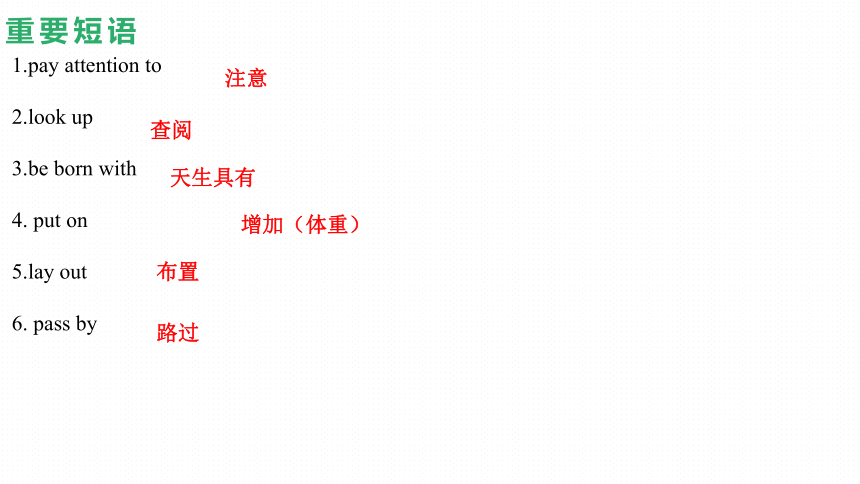
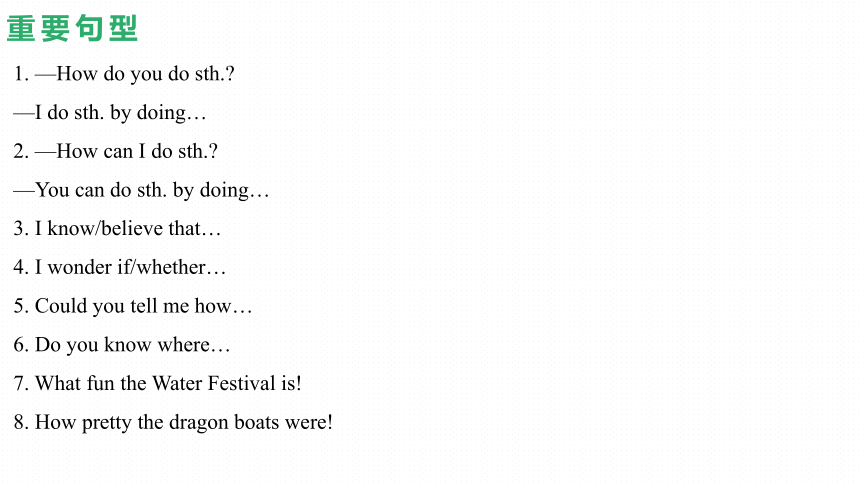

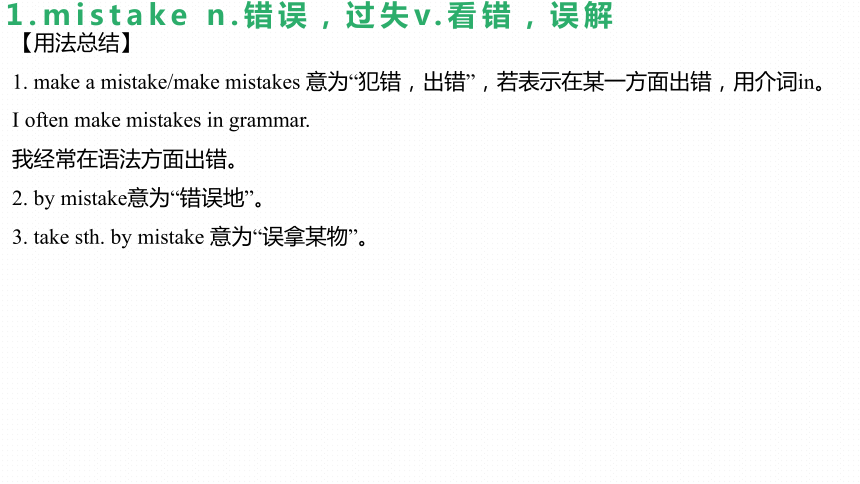
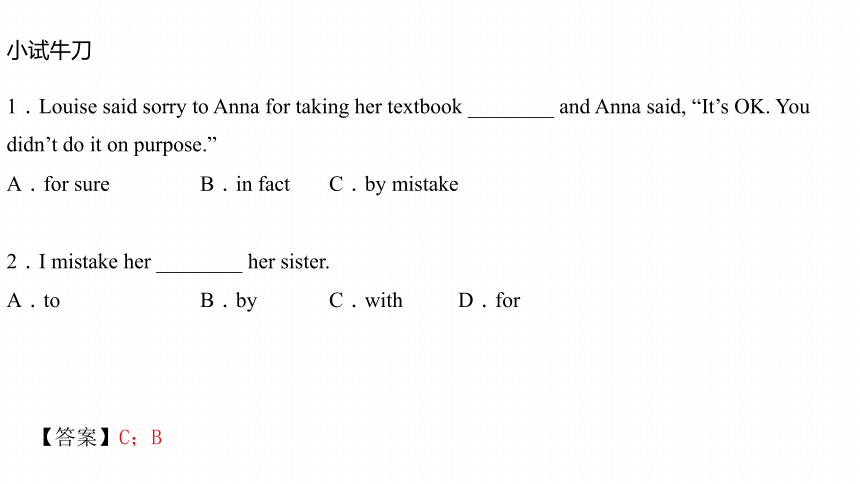
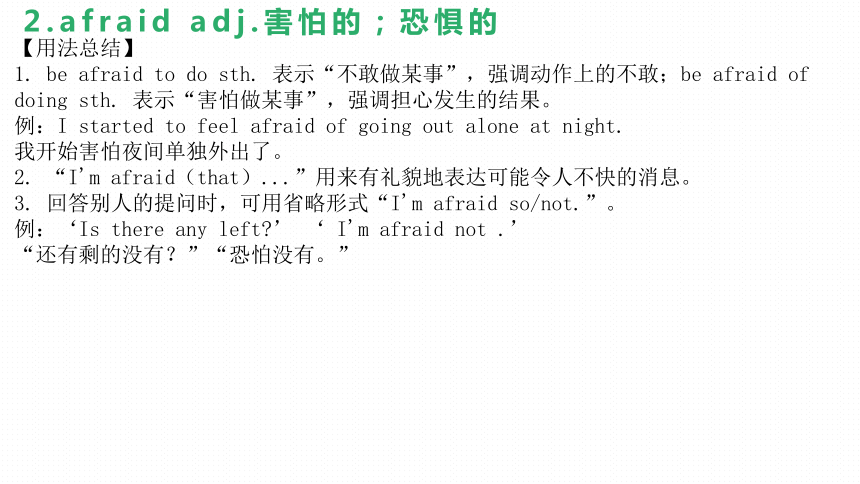
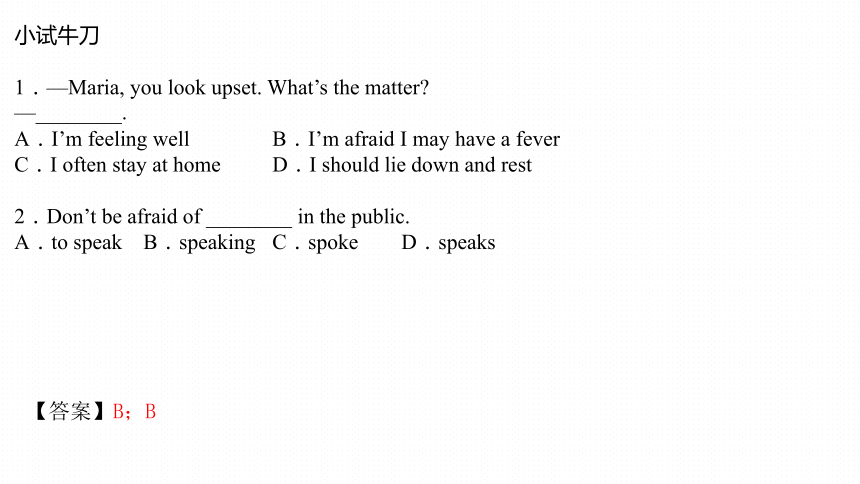
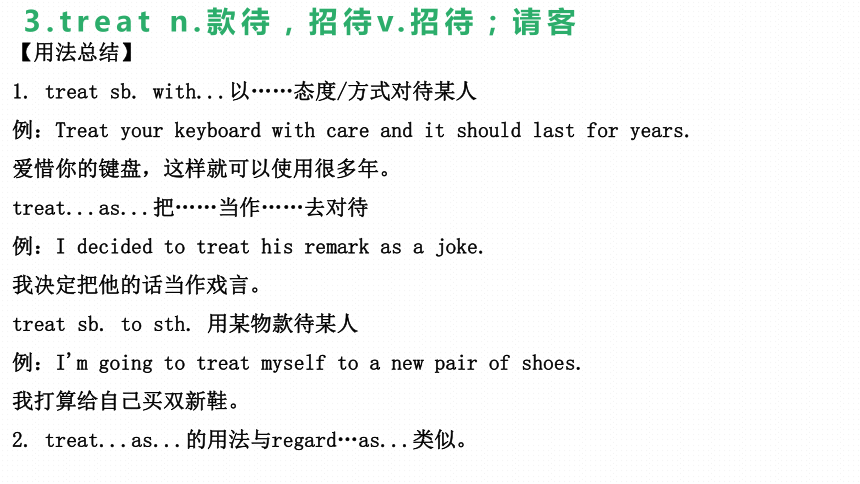
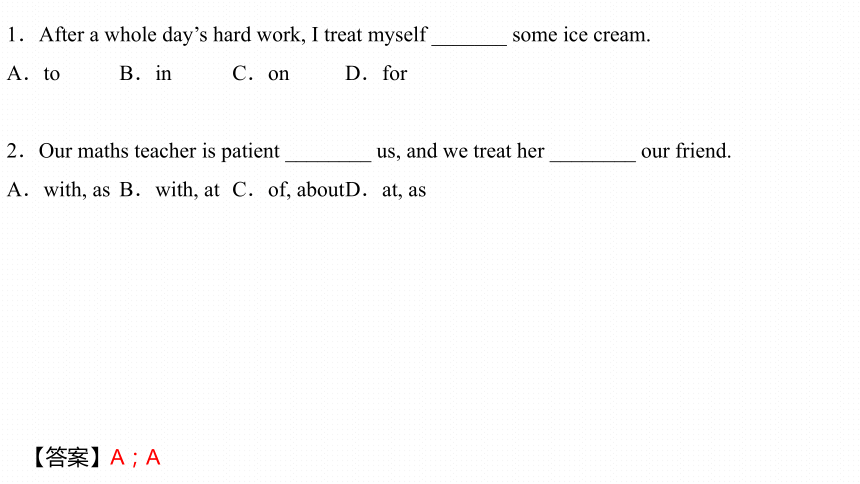
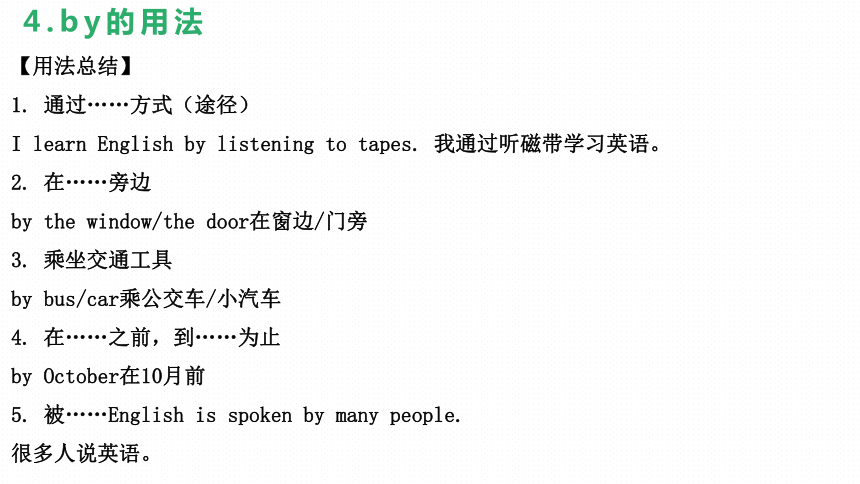
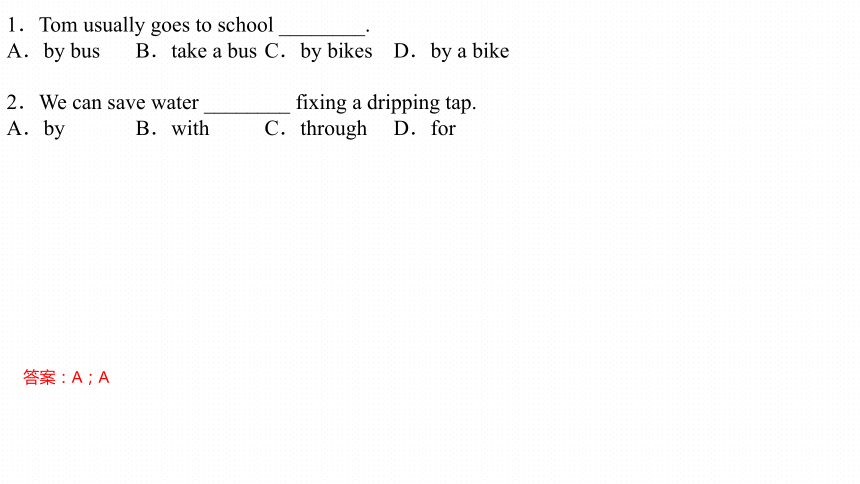
文档简介
(共32张PPT)
Unit 1-3词汇短语复习
九
最新人教版
全册
单元总复习
/ 让教学更有效 高效备考| 英语学科
1.pay attention to
2.look up
3.be born with
4. put on
5.lay out
6. pass by
重要短语
注意
查阅
天生具有
布置
路过
增加(体重)
1. —How do you do sth.
—I do sth. by doing…
2. —How can I do sth.
—You can do sth. by doing…
3. I know/believe that…
4. I wonder if/whether…
5. Could you tell me how…
6. Do you know where…
7. What fun the Water Festival is!
8. How pretty the dragon boats were!
重要句型
Unit 1-3
语法汇集
九年级
最新人教版
全册
/ 让教学更有效 高效备考| 英语学科
1.mistake n.错误,过失v.看错,误解
【用法总结】
1. make a mistake/make mistakes 意为“犯错,出错”,若表示在某一方面出错,用介词in。
I often make mistakes in grammar.
我经常在语法方面出错。
2. by mistake意为“错误地”。
3. take sth. by mistake 意为“误拿某物”。
小试牛刀
1.Louise said sorry to Anna for taking her textbook ________ and Anna said, “It’s OK. You didn’t do it on purpose.”
A.for sure B.in fact C.by mistake
2.I mistake her ________ her sister.
A.to B.by C.with D.for
【答案】C;B
2.afraid adj.害怕的;恐惧的
【用法总结】
1. be afraid to do sth. 表示“不敢做某事”,强调动作上的不敢;be afraid of doing sth. 表示“害怕做某事”,强调担心发生的结果。
例:I started to feel afraid of going out alone at night.
我开始害怕夜间单独外出了。
2. “I'm afraid(that)...”用来有礼貌地表达可能令人不快的消息。
3. 回答别人的提问时,可用省略形式“I'm afraid so/not.”。
例:‘Is there any left ’ ‘ I'm afraid not .’
“还有剩的没有?”“恐怕没有。”
小试牛刀
1.—Maria, you look upset. What’s the matter
—________.
A.I’m feeling well B.I’m afraid I may have a fever
C.I often stay at home D.I should lie down and rest
2.Don’t be afraid of ________ in the public.
A.to speak B.speaking C.spoke D.speaks
【答案】B;B
【用法总结】
1. treat sb. with...以……态度/方式对待某人
例:Treat your keyboard with care and it should last for years.
爱惜你的键盘,这样就可以使用很多年。
treat...as...把……当作……去对待
例:I decided to treat his remark as a joke.
我决定把他的话当作戏言。
treat sb. to sth. 用某物款待某人
例:I'm going to treat myself to a new pair of shoes.
我打算给自己买双新鞋。
2. treat...as...的用法与regard…as...类似。
3.treat n.款待,招待v.招待;请客
【答案】A;A
1.After a whole day’s hard work, I treat myself _______ some ice cream.
A.to B.in C.on D.for
2.Our maths teacher is patient ________ us, and we treat her ________ our friend.
A.with, as B.with, at C.of, about D.at, as
【用法总结】
1. 通过……方式(途径)
I learn English by listening to tapes. 我通过听磁带学习英语。
2. 在……旁边
by the window/the door在窗边/门旁
3. 乘坐交通工具
by bus/car乘公交车/小汽车
4. 在……之前,到……为止
by October在10月前
5. 被……English is spoken by many people.
很多人说英语。
4.by的用法
1.Tom usually goes to school ________.
A.by bus B.take a bus C.by bikes D.by a bike
2.We can save water ________ fixing a dripping tap.
A.by B.with C.through D.for
答案:A;A
【用法总结】
1. find强调找的“结果”。
We've found a great new restaurant near the office.
我们在办公室附近发现了一家挺好的新餐馆。
2. look for强调寻找的“动作”,不涉及结果。
I'm looking for my friend Dave.
我在找我的朋友戴夫。
3. find out强调“找出,查明,弄清楚”,是通过调查、计算、实验、询问或努力等得知。
I'll find out who broke the window.
我会查明是谁打破窗户的。
5.find,look for,find out辨析
练一练:
1.She is always busy _______ things and usually she won’t _______ them.
A.to find; look for B.to look for; find
C.looking for; find D.finding; look for
2.They are trying ________ what is going on around the world.
A.find out B.to find out
C.look for D.to look for
【答案】C;B
6.discover,invent和create的区别
单词/短语 含义及用法
discover “发现;发觉”,指通过探险或偶然的机会发现了原本存在的东西
invent “发明;创造”,指通过科学手段制造了原本不存在的东西
create “创造;创建”,指从无到有的创作或创作出原来不存在的东西,如艺术作品、理论等
练一练:
1.He is a computer engineer. And he is trying to invent a new game now.
A.create B.operate C.play
2.Writing has helped me to ________ myself. The ________ of me will help me improve myself further.
A.rediscover; rediscovery B.discover; discover
C.discoverer; discovery D.rediscovery; discovery
【答案】A;A
【用法总结】
在复合句中作宾语的句子叫“宾语从句”。
7.宾语从句的用法
宾语从句 连接词 1. 陈述句作宾语从句时,用that作连接词(可以省略)
2. 一般疑问句作宾语从句时,用if/whether连接(不能省略)
3. 特殊疑问句作宾语从句时,用疑问词连接(不能省略)
语序 陈述语序
时态 1. 如果主句是现在时态,从句用所需时态
2. 如果主句是过去时态,从句用相应的过去时态(客观真理、客观事实用一般现在时)
练一练
1.— Could you please tell me ________
— It’s next to the bank.
A.where is the supermarket B.where the supermarket is
C.where was the supermarket D.where the supermarket was
2.You have no idea ________ to build a new airport. Let me tell you, young man. That’s billions of dollars!
A.how much it will cost us B.how long it will take us
C.how much will it cost us D.how long will it take us
【答案】B ;A
【用法总结】
8.increase增加;增长
increase by增加了(◆后接差额、倍数或百分数)
increase to增加到(◆后接总数,即原有部分与所增加部分的总和)
例 The population of our city has increased by 40%, compared with that of 3 years ago.与3年前相比,我们城市的人口增加了40%。
练一练
1.The population of this city has increased ________ twenty percent in the past ten years.
A.to B.for C.by D.on
2.Last year, there were only 3000 students in our school. But the number has increased ________ 3500 this year.
A.to B.by C.up
【答案】C;A
9.lay/le /v.放置;安放;产(卵);下(蛋)
lay out摆开;布置 lay aside搁在一边;存,积蓄
lay down放下 lay off解雇;停止(某事)
例 Dr. Ma laid his papers on the desk for the young doctors to study.
马博士把他的论文放在桌子上,让年轻的医生们学习。
【练一练】
1.A rooster (公鸡) ________ on the grass ________ that he had ________ an egg.
A.lie; lied; lain B.lying; lay; laid C.lying; lied; laid D.laying; lay; lied
2.When Annie got home, she _________ the bags on the table quickly and then ________ down on the sofa to have a rest.
A.lay; laid B.laid; lie C.laid; lay
【答案】C;C
10.感叹句
感叹句分别由what和how引导。它们的句式结构分别为:
What+(a/an+)形容词+名词+主语+谓语!
How+形容词+(a/an+名词+)主语+谓语!
例 What beautiful weather we have!天气真好啊!
例 How tall a boy he is!真是个高个子的男孩啊!(What a tall boy he is!)
1.________ useful advice our Chinese teacher gave me!
A.How a B.What C.What a D.How
2.—Have you heard that Mr. Zhang saved his neighbor from a big fire last night
—Yes. ________ brave the young man is!
A.What a B.How C.What D.How a
【答案】B;B
【用法总结】
11.suggest v.建议;提议v.暗示,表明
suggest后接that从句时,若表示“建议”,从句用虚拟语气,即“(should+)动词原形”;若表示“暗示,表明”,则不用虚拟语气。
suggest doing sth.建议做某事
例 He suggested that young people should spend more time reading.
他建议年轻人应该多花点时间读书。
要点归纳
建议 动词 suggest:suggest doing sth. advise advise sb.(not)to do sth.
advise doing sth.
名词 suggestion:可数名词 advice:不可数名词 1.I suggest you ________ a phone call to him immediately.
A.made B.make C.making D.to make
2.—Miss Li, can you tell me how to improve my writing skills
—Certainly. I advise you ________ a diary in English every day.
A.to keep B.keeping C.kept D.to keeping
【答案】C ;A
1.—Jack, would you like to see the movie Lion King with me
—It’s an interesting film, but I ________ it.
A.see B.will see C.have seen D.saw
2.—Have you got the letter from your pen pal
—Not ________.
A.all B.yet C.ever D.much
【答案】C ;B
Unit 1-3
基础练习
九年级
最新人教版
全册
/ 让教学更有效 高效备考| 英语学科
1.—It is reported that the Chinese Women’s soccer team won the 2022 Asian Cup.
—________ exciting news it is! We should learn from their spirit.
A.What a B.How a C.What D.How
2.—Remember Carol She is still in good shape and looks even younger though years has passed.
—Oh, really I haven’t seen her for nearly ten years. Could you tell me ________
A.that she has got married B.how she can manage to do that
C.where she has gone these years D.when would she visit Changzhou
3.As students, we can save paper ________ on both sides of the paper.
A.by write B.by writing C.on writing D.with write
4.Our teachers advise our middle school students ________ at least one hour ________ exercise every day to keep healthy.
A.to spend; taking B.spending; to take
C.spending; taking D.to spend; to take
5.—Why are you so angry
—My daughter ________ to me that she ________ the money on the desk, but in fact she spent it on ice-cream.
A.lied; lay B.lied; laid C.lay; laid D.laid; lay
一、单项选择
答案:CBBAB
二、1.at the speed of 2.pass people’s wishes 3.similar to 4.wanders if there is
二、完成句子
1.这辆火车的运行速度为每小时80千米。
The train is traveling ________ ________ ________ ________ eighty kilometers per hour.
2.它们把人们的祝愿传递给他们所爱和思念的家人。
They ________ ________ ________ to the families they love and miss.
3.我想知道它是否类似于云南省傣族的泼水节。
I wonder if it’s ________ ________ the Water Festival of the Dai people in Yunnan Province.
4.本正想知道这个购物中心里是否有银行。
Ben ________ ________ ________ ________ a bank in the shopping center.
三、阅读理解
We know good manners are important. Today I am going to tell you something about manners in different countries. I think you already know that people in different countries usually have different ways of doing things. Something that is rude in one country may be quite polite in another. For example, in Britain you mustn’t lift your bowl to your mouth when you are having liquid food. That is considered bad manners in Britain. But in Japan you needn’t worry about making a noise when you drink something. It shows that you are enjoying it. In Britain we try not to put our hands on the table at all during a meal. In Mexico, however, guests are expected to keep their hands on the table throughout a meal. In Arabic countries we must be careful with our hands. You see, in Arabic countries you mustn’t eat with your left hand. This is considered to be very impolite. So, what should you do if you visit a foreign country Well, you needn’t worry. You can ask the native people there to help you and you can just watch carefully and try to do what they do.
1.In Arabic countries you must be careful with your _______.
A.feet B.mouth C.eyes D.hands
2.In Britain we try not to put our hands _______ during a meal.
A.on the desk B.in the bed C.on the table D.in the pocket
3.Which of the following is TRUE
A.In different countries, the manners are the same.B.Manners are different in different countries.
C.Good manners are not important.D.In Arabic countries we mustn’t be careful with our hands.
4.What’s the meaning of the underlined word “throughout”
A.穿过 B.贯穿 C.通过 D.横过
二:DCBB
Thank you!
Unit 1-3词汇短语复习
九
最新人教版
全册
单元总复习
/ 让教学更有效 高效备考| 英语学科
1.pay attention to
2.look up
3.be born with
4. put on
5.lay out
6. pass by
重要短语
注意
查阅
天生具有
布置
路过
增加(体重)
1. —How do you do sth.
—I do sth. by doing…
2. —How can I do sth.
—You can do sth. by doing…
3. I know/believe that…
4. I wonder if/whether…
5. Could you tell me how…
6. Do you know where…
7. What fun the Water Festival is!
8. How pretty the dragon boats were!
重要句型
Unit 1-3
语法汇集
九年级
最新人教版
全册
/ 让教学更有效 高效备考| 英语学科
1.mistake n.错误,过失v.看错,误解
【用法总结】
1. make a mistake/make mistakes 意为“犯错,出错”,若表示在某一方面出错,用介词in。
I often make mistakes in grammar.
我经常在语法方面出错。
2. by mistake意为“错误地”。
3. take sth. by mistake 意为“误拿某物”。
小试牛刀
1.Louise said sorry to Anna for taking her textbook ________ and Anna said, “It’s OK. You didn’t do it on purpose.”
A.for sure B.in fact C.by mistake
2.I mistake her ________ her sister.
A.to B.by C.with D.for
【答案】C;B
2.afraid adj.害怕的;恐惧的
【用法总结】
1. be afraid to do sth. 表示“不敢做某事”,强调动作上的不敢;be afraid of doing sth. 表示“害怕做某事”,强调担心发生的结果。
例:I started to feel afraid of going out alone at night.
我开始害怕夜间单独外出了。
2. “I'm afraid(that)...”用来有礼貌地表达可能令人不快的消息。
3. 回答别人的提问时,可用省略形式“I'm afraid so/not.”。
例:‘Is there any left ’ ‘ I'm afraid not .’
“还有剩的没有?”“恐怕没有。”
小试牛刀
1.—Maria, you look upset. What’s the matter
—________.
A.I’m feeling well B.I’m afraid I may have a fever
C.I often stay at home D.I should lie down and rest
2.Don’t be afraid of ________ in the public.
A.to speak B.speaking C.spoke D.speaks
【答案】B;B
【用法总结】
1. treat sb. with...以……态度/方式对待某人
例:Treat your keyboard with care and it should last for years.
爱惜你的键盘,这样就可以使用很多年。
treat...as...把……当作……去对待
例:I decided to treat his remark as a joke.
我决定把他的话当作戏言。
treat sb. to sth. 用某物款待某人
例:I'm going to treat myself to a new pair of shoes.
我打算给自己买双新鞋。
2. treat...as...的用法与regard…as...类似。
3.treat n.款待,招待v.招待;请客
【答案】A;A
1.After a whole day’s hard work, I treat myself _______ some ice cream.
A.to B.in C.on D.for
2.Our maths teacher is patient ________ us, and we treat her ________ our friend.
A.with, as B.with, at C.of, about D.at, as
【用法总结】
1. 通过……方式(途径)
I learn English by listening to tapes. 我通过听磁带学习英语。
2. 在……旁边
by the window/the door在窗边/门旁
3. 乘坐交通工具
by bus/car乘公交车/小汽车
4. 在……之前,到……为止
by October在10月前
5. 被……English is spoken by many people.
很多人说英语。
4.by的用法
1.Tom usually goes to school ________.
A.by bus B.take a bus C.by bikes D.by a bike
2.We can save water ________ fixing a dripping tap.
A.by B.with C.through D.for
答案:A;A
【用法总结】
1. find强调找的“结果”。
We've found a great new restaurant near the office.
我们在办公室附近发现了一家挺好的新餐馆。
2. look for强调寻找的“动作”,不涉及结果。
I'm looking for my friend Dave.
我在找我的朋友戴夫。
3. find out强调“找出,查明,弄清楚”,是通过调查、计算、实验、询问或努力等得知。
I'll find out who broke the window.
我会查明是谁打破窗户的。
5.find,look for,find out辨析
练一练:
1.She is always busy _______ things and usually she won’t _______ them.
A.to find; look for B.to look for; find
C.looking for; find D.finding; look for
2.They are trying ________ what is going on around the world.
A.find out B.to find out
C.look for D.to look for
【答案】C;B
6.discover,invent和create的区别
单词/短语 含义及用法
discover “发现;发觉”,指通过探险或偶然的机会发现了原本存在的东西
invent “发明;创造”,指通过科学手段制造了原本不存在的东西
create “创造;创建”,指从无到有的创作或创作出原来不存在的东西,如艺术作品、理论等
练一练:
1.He is a computer engineer. And he is trying to invent a new game now.
A.create B.operate C.play
2.Writing has helped me to ________ myself. The ________ of me will help me improve myself further.
A.rediscover; rediscovery B.discover; discover
C.discoverer; discovery D.rediscovery; discovery
【答案】A;A
【用法总结】
在复合句中作宾语的句子叫“宾语从句”。
7.宾语从句的用法
宾语从句 连接词 1. 陈述句作宾语从句时,用that作连接词(可以省略)
2. 一般疑问句作宾语从句时,用if/whether连接(不能省略)
3. 特殊疑问句作宾语从句时,用疑问词连接(不能省略)
语序 陈述语序
时态 1. 如果主句是现在时态,从句用所需时态
2. 如果主句是过去时态,从句用相应的过去时态(客观真理、客观事实用一般现在时)
练一练
1.— Could you please tell me ________
— It’s next to the bank.
A.where is the supermarket B.where the supermarket is
C.where was the supermarket D.where the supermarket was
2.You have no idea ________ to build a new airport. Let me tell you, young man. That’s billions of dollars!
A.how much it will cost us B.how long it will take us
C.how much will it cost us D.how long will it take us
【答案】B ;A
【用法总结】
8.increase增加;增长
increase by增加了(◆后接差额、倍数或百分数)
increase to增加到(◆后接总数,即原有部分与所增加部分的总和)
例 The population of our city has increased by 40%, compared with that of 3 years ago.与3年前相比,我们城市的人口增加了40%。
练一练
1.The population of this city has increased ________ twenty percent in the past ten years.
A.to B.for C.by D.on
2.Last year, there were only 3000 students in our school. But the number has increased ________ 3500 this year.
A.to B.by C.up
【答案】C;A
9.lay/le /v.放置;安放;产(卵);下(蛋)
lay out摆开;布置 lay aside搁在一边;存,积蓄
lay down放下 lay off解雇;停止(某事)
例 Dr. Ma laid his papers on the desk for the young doctors to study.
马博士把他的论文放在桌子上,让年轻的医生们学习。
【练一练】
1.A rooster (公鸡) ________ on the grass ________ that he had ________ an egg.
A.lie; lied; lain B.lying; lay; laid C.lying; lied; laid D.laying; lay; lied
2.When Annie got home, she _________ the bags on the table quickly and then ________ down on the sofa to have a rest.
A.lay; laid B.laid; lie C.laid; lay
【答案】C;C
10.感叹句
感叹句分别由what和how引导。它们的句式结构分别为:
What+(a/an+)形容词+名词+主语+谓语!
How+形容词+(a/an+名词+)主语+谓语!
例 What beautiful weather we have!天气真好啊!
例 How tall a boy he is!真是个高个子的男孩啊!(What a tall boy he is!)
1.________ useful advice our Chinese teacher gave me!
A.How a B.What C.What a D.How
2.—Have you heard that Mr. Zhang saved his neighbor from a big fire last night
—Yes. ________ brave the young man is!
A.What a B.How C.What D.How a
【答案】B;B
【用法总结】
11.suggest v.建议;提议v.暗示,表明
suggest后接that从句时,若表示“建议”,从句用虚拟语气,即“(should+)动词原形”;若表示“暗示,表明”,则不用虚拟语气。
suggest doing sth.建议做某事
例 He suggested that young people should spend more time reading.
他建议年轻人应该多花点时间读书。
要点归纳
建议 动词 suggest:suggest doing sth. advise advise sb.(not)to do sth.
advise doing sth.
名词 suggestion:可数名词 advice:不可数名词 1.I suggest you ________ a phone call to him immediately.
A.made B.make C.making D.to make
2.—Miss Li, can you tell me how to improve my writing skills
—Certainly. I advise you ________ a diary in English every day.
A.to keep B.keeping C.kept D.to keeping
【答案】C ;A
1.—Jack, would you like to see the movie Lion King with me
—It’s an interesting film, but I ________ it.
A.see B.will see C.have seen D.saw
2.—Have you got the letter from your pen pal
—Not ________.
A.all B.yet C.ever D.much
【答案】C ;B
Unit 1-3
基础练习
九年级
最新人教版
全册
/ 让教学更有效 高效备考| 英语学科
1.—It is reported that the Chinese Women’s soccer team won the 2022 Asian Cup.
—________ exciting news it is! We should learn from their spirit.
A.What a B.How a C.What D.How
2.—Remember Carol She is still in good shape and looks even younger though years has passed.
—Oh, really I haven’t seen her for nearly ten years. Could you tell me ________
A.that she has got married B.how she can manage to do that
C.where she has gone these years D.when would she visit Changzhou
3.As students, we can save paper ________ on both sides of the paper.
A.by write B.by writing C.on writing D.with write
4.Our teachers advise our middle school students ________ at least one hour ________ exercise every day to keep healthy.
A.to spend; taking B.spending; to take
C.spending; taking D.to spend; to take
5.—Why are you so angry
—My daughter ________ to me that she ________ the money on the desk, but in fact she spent it on ice-cream.
A.lied; lay B.lied; laid C.lay; laid D.laid; lay
一、单项选择
答案:CBBAB
二、1.at the speed of 2.pass people’s wishes 3.similar to 4.wanders if there is
二、完成句子
1.这辆火车的运行速度为每小时80千米。
The train is traveling ________ ________ ________ ________ eighty kilometers per hour.
2.它们把人们的祝愿传递给他们所爱和思念的家人。
They ________ ________ ________ to the families they love and miss.
3.我想知道它是否类似于云南省傣族的泼水节。
I wonder if it’s ________ ________ the Water Festival of the Dai people in Yunnan Province.
4.本正想知道这个购物中心里是否有银行。
Ben ________ ________ ________ ________ a bank in the shopping center.
三、阅读理解
We know good manners are important. Today I am going to tell you something about manners in different countries. I think you already know that people in different countries usually have different ways of doing things. Something that is rude in one country may be quite polite in another. For example, in Britain you mustn’t lift your bowl to your mouth when you are having liquid food. That is considered bad manners in Britain. But in Japan you needn’t worry about making a noise when you drink something. It shows that you are enjoying it. In Britain we try not to put our hands on the table at all during a meal. In Mexico, however, guests are expected to keep their hands on the table throughout a meal. In Arabic countries we must be careful with our hands. You see, in Arabic countries you mustn’t eat with your left hand. This is considered to be very impolite. So, what should you do if you visit a foreign country Well, you needn’t worry. You can ask the native people there to help you and you can just watch carefully and try to do what they do.
1.In Arabic countries you must be careful with your _______.
A.feet B.mouth C.eyes D.hands
2.In Britain we try not to put our hands _______ during a meal.
A.on the desk B.in the bed C.on the table D.in the pocket
3.Which of the following is TRUE
A.In different countries, the manners are the same.B.Manners are different in different countries.
C.Good manners are not important.D.In Arabic countries we mustn’t be careful with our hands.
4.What’s the meaning of the underlined word “throughout”
A.穿过 B.贯穿 C.通过 D.横过
二:DCBB
Thank you!
